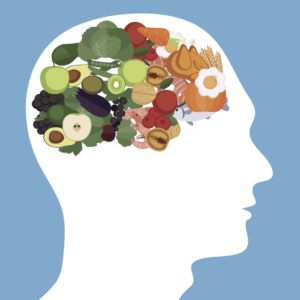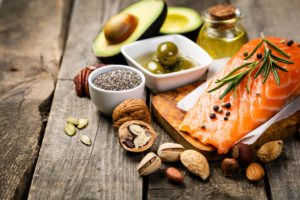Wellness Check
Good Mood Foods: Eating Your Way to a Better Mindset
Oct 2022 | By Annie Gaudreault
Eat Your Way to a Better Mood
Why does food matter when it comes to our mental well-being? And what would a nutritionist know about improving mental health?
As it turns out, a lot! Not surprisingly, we have seen unprecedented levels of anxiety through our pandemic years in adults and children, but particularly, among women.
Another not surprising statistic is that the use of medications for anxiety, depression and insomnia are significantly up from pre-pandemic levels. While there is definitely a place for medication in a treatment plan, we do know that diet has been ignored. The emergent field of nutritional psychiatry offers hope and support about how our food truly impacts our moods.
Good Food = Good Mood
Aristotle is quoted as saying, “All diseases begin in the gut.” As it turns out, he was onto something! As we’ve come to learn, the gut is responsible for a whole lot more than just digestion.
Did you know that 80 percent of our immunity comes from the gut? It’s also our largest endocrine (hormone-producing) organ and impacts a range of things in our body, from sleep, to energy, the quality of our skin, as well as our moods. The gut is truly our hub and so much is controlled there. This is the reason that the gut is often referred to as “the second brain”.
 What Happens in the Gut (Doesn’t Stay in the Gut)
What Happens in the Gut (Doesn’t Stay in the Gut)
Your gut is connected to your brain by a ‘highway’ (aka the vagus nerve) which sends signals back and forth between your gut and your brain.
Many of our feel-good hormones, such as serotonin (happy), dopamine (reward) and GABA (calm) are mostly produced in the gut. This is critical because when your diet includes nourishing food that gets broken down properly in the gut, it allows your endocrine system to produce these hormones and send them up to your brain! Otherwise, you compromise your ability to produce these feel-good hormones.
The Essentials to Help Minimize Symptoms of Anxiety and Depression
Of course, someone dealing with anxiety and/or depression should go through a proper course of treatment with a licensed practitioner. However, food should be an essential part of that protocol. For one, we have come to learn that individuals diagnosed with depression almost always have a compromised gut in some way.
My recommendation? Eating in the Mediterranean diet “pattern”, which is based on consuming real, unprocessed food, focusing on vegetables, legumes, whole grains, fruit, eggs, some lean meat, eggs, yogurt, cheese, and fish.
Here are just some of the foods, vitamins, minerals and nutrients you want to be focusing on:
Omega-3 fats – Should be consumed daily. This type of fat allows the brain to remain flexible and reduces inflammation. Sources include:
- Cold-water fish (trout, salmon, tuna, sardines, anchovies, haddock)
- Ground flax
- Walnuts
- Extra virgin olive oil
Vitamin B9 (Folate) – Essential nutrient for the brain. Sources include:
- Liver
- Dairy products
- Egg yolk
- Oranges
- Dark leafy vegetables
- Peanuts and legumes (beans, lentils)
Magnesium – Mineral that’s great for its calming ability. Sources include:
- Soybeans – choose non-GMO
- Cashews, almonds
- Black beans
- Spinach
- Dark leafy greens
Iron – Excellent for energy. Helps to carry the oxygen in the blood. Great support for the hormones. Pro tip: Have with lemon juice to help with absorption. Sources include:
- Dark chocolate – at least 70% cocoa content
- Oysters
- Red meat
- Spinach
- Sesame and pumpkin seeds
Zinc, Selenium – Sources include:
- Brazil nuts
- Seafood
- Red meat
- Lentils, brown rice
Tryptophan – Amino acid that is very calming. Add a complex carb for the full effect, such as quinoa, rice, sweet potatoes, etc. Sources include:
- Turkey, chicken
- Eggs
- Chickpeas
- Soy
Herbs & Spices – Can have very powerful medicinal impact. Some favourites:
- Saffron
- Turmeric – to increase its absorption, add black pepper
- Lavender – be sure to use high quality essential oils
Probiotics – If you ever take antibiotics, one of their issues is that they also remove good bacteria, so you want to make sure you repopulate the good bacteria. Think of probiotics as fertilizer for your gut. Fermented foods contain probiotics, these include:
- Yogurt or kefir (plain)
- Miso
- Sauerkraut
- Kimchi
- Kombucha
- Pickles
- Tempeh
- Some cheeses (Gouda, Emmenthal)
Other key nutrients:
- High fiber foods – vegetables, fruit, whole grains
- Vitamin D, B12 B6, A, C and E
- Potassium
What Messes Up Our Moods?


Plenty of guilty parties here! Avoid fried foods, ultra processed and refined foods, sugar, artificial sweeteners, and even drugs (because they can alter the gut). All refined grains such as commercial white bread will also wreak havoc on our mood.
At the end of the day, we do feel what we eat. So, if you can avoid sugar, artificial sweeteners, processed foods and trans fats that are not serving you and focus more on a variety of nutrient-rich foods throughout the week, you’re likely to be hitting your nutrient needs, making for a happier gut!
Because when we change our diet, we can literally change our life.
Annie Gaudreault is a nutritionist, speaker, coach and trainer helping hundreds of midlife women make sense of the wellness information out there and make sustainable changes to their health. You can read more at Veev Health and Wellness.

